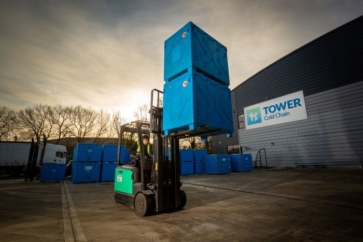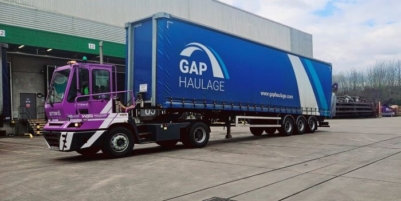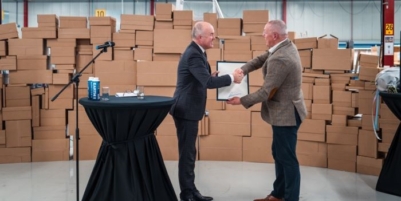-
Nutrivend selects Forterro’s Orderwise to support online expansion and streamline operations - April 11, 2025
-
ARROWXL LAUNCHES AMBITIOUS ZERO WASTE ROADMAP - April 8, 2025
-
THE BCMPA’S NEW CAMPAIGN DRIVES OUTSOURCING SUCCESS IN Q1 - April 7, 2025
-
BLACKOUT TECHNOLOGIES TARGETS TELEMATICS-INTEGRATED MOBILE DEVICE BLOCKING TO COMBAT SMARTPHONE DISTRACTION - April 1, 2025
-
Sparck Technologies awarded Royal designation - March 27, 2025
-
OpenADR Alliance announces first OpenADR 3.0 certified products with EVoke Systems, E.ON Energy and Universal Devices - March 25, 2025
-
Growing fulfilment and contract packer appoints new Managing Director - March 25, 2025
-
When is it time to invest in a WMS? Understanding the key trigger points - March 25, 2025
-
eCapital helps Vantage Recruitment on its journey to financial success - March 24, 2025
-
Hugo Beck Celebrates 70 Years of Packaging Innovation with Open House Events - March 20, 2025
A new study from Cardiff Business School, commissioned by pharmaceutical transportation specialist Tower Cold Chain, is set to focus on maximising the proximity and availability of Tower’s reusable temperature-controlled containers around the world, while minimising unnecessary journeys.
By analysing Tower’s real-life historical shipment data, Cardiff Business School will develop a model to optimise global stock location strategies. As well as minimising CO2 emissions caused by superfluous movement, the use of intelligent stock management through Optimisation and Simulation techniques will ensure maximum availability of Tower’s containers to its customers.
Tower Cold Chain is committed to supporting the global transportation of critical pharmaceutical materials using its system of robust, reliable and reusable containers. While the reusable model is a more sustainable solution than single-use containers, the complex logistics involved mean that the new study provides an invaluable resource for system optimisation.
“We have a growing network of hubs located at airports around the world, to ensure customers can source the appropriate cold chain container locally,” said Kevin Doran, Global Head of Supply Chain at Tower Cold Chain.
“Global demand can be difficult to forecast. Complexity of multiple stakeholders and exacting product needs creates challenges to have the right stock in the right place at the right time. Ensuring availability can lead to wasted resources so it is a process of balancing overproduction of containers with excessive movement between deployments.
“Clearly, the more synergies that can be identified, the fewer wasted movements there will be – and that’s what Cardiff Business School’s study of our data will help to deliver,” he added.
Cardiff Business School is the world’s first Public Value Business School, with a clear mission of making a positive impact regionally and globally. Amongst its work, the School’s international faculty of scholars works closely with different organisations to conduct research on contemporary challenges in logistics and operations management and supply chains.
The study will harness the School’s world-wide reputation in supply network modelling and design, and exploit multi-objective optimisation techniques developed at Cardiff to determine hub locations and allocate cargo. Working together, Tower and Cardiff Business School will analyse this unique process challenge and identify data derived strategies to address wasted motion in the industry and provide sustainable growth strategies to meet a growing global demand for cold chain distribution solutions.
Dr. Dnyaneshwar Mogale, a Lecturer in Logistics and Operations Management, leading the academic input to the project, says “This is a wonderful opportunity to apply our fundamental research findings, published in world-leading journals, in a practical setting. By co-creating and delivering the project we will help Tower Cold Chain and its customers specifically and, with our holistic systems approach, we will ensure that the environment and society also has a ‘voice.’”
The study will focus on the operational requirements of existing and planned container utilisation. All sources of inputs will be considered, such as hub location, transit times, global sources of activity, movement efficiency, monetary costs, and environmental impact.
The impact of these input variables will be evaluated against three key outputs: i.e., wasted movement of empty containers, availability of containers to our customers and overall operational costs.
Optimisation and simulation techniques will be used to study historical movements and provide a framework for future modelling of new opportunities and growth strategies
The end goal is to identify a novel decision-making framework that will support the rapid identification of movement and stock location strategies that will minimise CO2e emission and help to consistently send temperature sensitive products to hospitals and pharmacies.
Tower believes that, through efficient deployment of stock and reduction of waste, the study will ultimately lead to a lower cost base. “We want to make sure that vital cold chain logistics are available to as broad a cross section of the global community as possible. Cardiff Business School will help us to achieve this sustainably, effectively and productively,” concluded Kevin.
































